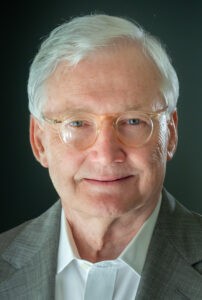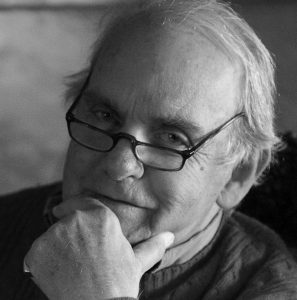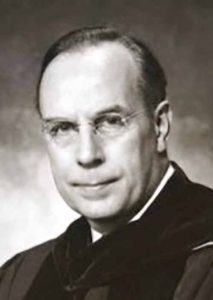It was Carlyle Marney, I think, who first named our personal saints in the “great cloud of witnesses” as those in “the balcony of heaven.” On the occasion of the death of Frederick Buechner, I offer these memories of the two in my life.
George Buttrick warned against anecdotes in sermons, especially our own, as a form of “anecdotage,” but I hope he forgives these.

Stephen Shoemaker
I first read Buechner in his two early books of sermons, The Hungering Dark and The Magnificent Defeat. They were assigned as part of my homiletics class led by Ed Steimle at Union Theological Seminary in the early 1970s. I was stunned by the beauty and truth of the sermons and especially by the short prayers at the end of each sermon in the former. That’s where his profound impact began.
When I came to Southern Baptist Theological Seminary in Louisville for my Ph.D. work, by a remarkable providence, I became the graduate assistant to George Buttrick, one of the great preachers and pastor/theologians of the 20th century. He had been called by Louisville Presbyterian Seminary and Southern Seminary to teach preaching. All the courses were at Southern, and Baptist students and preachers returning for D.Min. work flocked to him.
“I began every course introducing Buttrick by reading the conversion story of Frederick Buechner during a sermon by Buttrick at Madison Avenue Presbyterian Church.”
The years I was his assistant I began every course introducing Buttrick by reading the conversion story of Frederick Buechner during a sermon by Buttrick at Madison Avenue Presbyterian Church in New York City.
Buechner wrote this account in The Alphabet of Grace:
At 27, living alone in New York trying with no success to start a novel and in love with a girl who was not in love with me, I went to hear a famous preacher preach one morning although I had no idea at the time that he was famous and went only on impulse — I was not a churchgoer — because his church was next door. It was around the time that Queen Elizabeth was crowned at Westminster Abbey, and the preacher played variations on the theme of coronation. All I remember of what he said is the very last, and that not well, just one phrase of it, in fact, that I’m sure of. He said that Jesus refused a crown when Satan offered it in the wilderness, or something like that. He said that the kingdom of Jesus was not of this world. And yet again and again, he said, Jesus was crowned in the hearts of those who believed in him, crowned king. I remember thinking that was a nice enough image, as images in sermons go, and I remember how the preacher looked up there in the pulpit twitching around a good deal, it seemed to me, and plucking at the lapels of his black gown. And then he went on just a few sentences more.

Frederick Buechner
He said that unlike Elizabeth’s coronation in the Abbey, this coronation of Jesus in the believer’s heart took place among confession — and I thought, yes, yes, confession — and tears, he said —and I thought tears, yes, perfectly plausible that the coronation of Jesus in the believer’s heart should take place among confession and tears. And then with his head bobbing up and down so that his glasses glittered, he said in his odd sandy voice, the voice of an old nurse, that the coronation of Jesus took place among confession and tears and then, as God as my witness, GREAT LAUGHTER, he said. Jesus is crowned among confession and tears and great laughter, and at the phrase GREAT LAUGHTER, for reasons that I have never satisfactorily understood, the great Wall of China crumbled and Atlantis rose up out of the sea, and on Madison Avenue, at 73rd Street, tears left from my face as though I had been slapped across the face.”
Not long after, Buechner, whose first novel had been hailed in The New York Times as the work of a great new novelist, came to Buttrick’s office and told him he wanted to become a minister. As Buttrick told me the story, he said to him, “I don’t want to lose a great novelist and gain a mediocre minister.” Buttrick said Buechner replied, “I’m not going to be a mediocre minister.”
Years later, I told Buechner the story and asked if it were true. Buechner blushed and said he didn’t remember it quite that way. What happened then was that Buttrick put on his hat and coat and drove Buechner across Manhattan to introduce him to Union Theological Seminary, where Buechner received an extraordinary theological education.
I began Buttrick’s classes with this passage to show the power of words in sermons, and not incidentally to introduce Buechner to them. George Buttrick’s lectures and his friendship as he took me under his wing shaped my life as a preacher and pastor more than any other person.
“He taught me that a sermon should move, as on a journey.”
He taught me that a sermon should move, as on a journey, the outline being more like a tryptic. He said every sermon should begin with the text and human experience and lead up a hill to the Christ whom he described as “surprise as mercy, outgoing gladness, rescue, healing and life.”

George Buttrick
Christ “is more real to us than we are to ourselves,” he would say. And that is how I experienced him, his life and preaching. He’d say if you had not finished the sermon or the pastoral prayer as time grew close, to finish the prayer. He taught the art of the close reading and interpretation of the biblical text as an essential part of the step-by-step construction of a sermon. He urged simplicity of words and speech in sermons.
One rule he gave was to avoid autobiographical reference in the sermon, which I followed religiously until Buechner showed me the power of listening to your life and offering the truest part of what you learned there to others. I still preach of my life sparingly because of Buttrick’s influence.
Buttrick also shaped my life as a pastor. He told of his regular visitation of his members, the ones who lived in the tenements, not just the silk-stocking crowd. He warned against quick autocratic change in the pastoral role. He was a faithful minister to his congregation.
Buechner’s writings have been a guide to me for 50 years. His books on my shelves are almost all dog-eared. He has written of grace more authentically and powerfully than anyone I know. He has helped those with doubts believe a bit more. The extraordinary flood of reflections on his life and writings this past week from people in many arenas of American life suggest he may have been the most influential writer of spiritual things of our time.
Two of my favorite passages of his have been widely quoted this week. The first:
If I were called upon to state in a few words the essence of everything I was trying to say both as a novelist and as preacher, it would be something like this: Listen to your life. See it for the fathomless mystery that it is. In the boredom and pain of it no less than in the excitement and gladness: touch, taste, smell your way to the holy and hidden heart of it because in the last analysis all moments are key moments, and life itself is grace.
The other, from his novel Godric, about the 12th century holy man:
The secret that we share I cannot tell in full. But this much I will tell. What’s lost is nothing to what’s found, and all the death that ever was, set next to life, would scarcely fill a cup.
Life forever and full, George and Fred.
Stephen Shoemaker serves as pastor of Grace Baptist Church in Statesville, N.C. He served previously as pastor of Myers Park Baptist in Charlotte, N.C.; Broadway Baptist in Fort Worth, Texas, and Crescent Hill Baptist in Louisville, Ky.
Related articles:
My two phone calls to Frederick Buechner | Opinion by Brett Younger
Celebrating a new generation of ministers overtaken by ‘the call’ | Opinion by Bill Leonard


